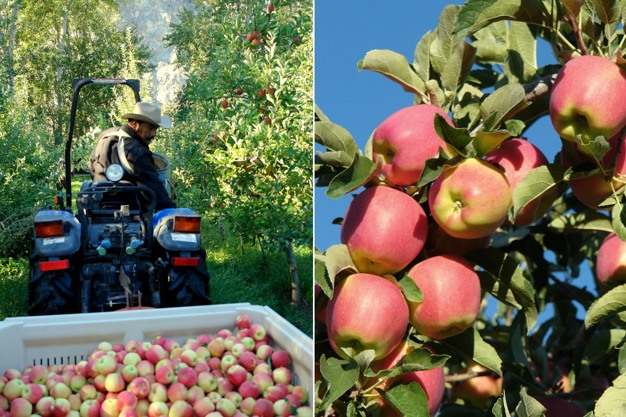While this year is a totally different apple year for Washington state compared to last year, concerns and challenges remain. "Last year, there were just too many apples in the market, which made it a really terrible year for growers," says Chris Ford with Viva Tierra Organic. Supply exceeded demand, grower prices were extremely low, and some growers went out of business as a result. "Honestly, the situation of oversupply is not great for the consumer either as they are still finding apples from last year's harvest in stores."
Competition
In short, Washington state is overgrowing. It's a combination of new acreage coming into production and storage technologies becoming better. The latter results in less product being wasted and more apples being available for the market. While supply continues to grow, demand is flat at best. "The industry as a whole just hasn't done a good job in making sure consumers have a consistent apple eating experience, which has created significant challenges," commented Ford. Today, consumers have more choices than ever buying high quality flavored fruits that are not apples. "Industries like table grapes and berries have made remarkable progress in breeding varieties that are flavorful and consistent in quality, but apples have lagged behind. As a result, apples are experiencing a lot of competition from other fruits."
Weight loss drugs
Ironically enough, competition is also being created within the apple category. "There are too many red varieties, and the marketing is very siloed and shipper specific. It results in unnecessary competition in the industry." In addition to external and internal competition, the third challenge is the rise of diabetes drugs for weight loss. These drugs help control blood sugar levels but also reduce hunger, resulting in a decrease in overall food consumption. With more and more people taking medication in an effort to lose weight, overall consumption of food decreases, including the consumption of apples.

This year, the Washington apple crop is expected to be more normal in size, but the share of organic has increased and now amounts to about 15 percent of the state's total apple volume. Usually, organic apple consumption takes off around January or February. By then, the crop has been harvested and regional apple sales start to wind down. With regional varieties disappearing from the shelves, more shelf space is available for organic apples, resulting in an uptick in consumption.
Oversupply or not, Ford believes there is always a market for good apples. That's also one of the pillars Viva Tierra Organic was built on: following the seasons and focusing on high-quality and flavor. As a result, Viva Tierra's Washington's program is complemented with an import program from the southern hemisphere that is now in its 33rd year. Following imports from Argentina, Chile and New Zealand, the apple season will shift to California early summer.
Short pear crop
Contrary to U.S. apples, the country's pear crop is extremely short this year. It is the shortest crop in 40 years, caused by different weather events. Production levels of the main varieties have all been heavily affected, but Ford believes this offers great opportunities for the southern hemisphere season. "It positions Argentina well for their export season, which kicks off in mid-February with Willams Bartlett. By that time, southern hemisphere pears will be highly anticipated."
 For more information:
For more information:
Chris Ford
Viva Tierra Organic
Tel: 831-917-7321
[email protected]
www.vivatierra.com
